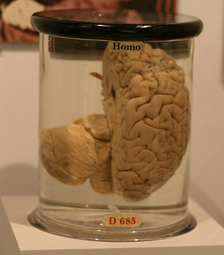 Image: Aigarius
Image: Aigarius The Sun decided to kick off the week that includes World Mental Health Day with an article that stigmatises and stereotypes people with mental health problems. Oh, and totally misrepresents the report the article is supposedly based on.
As Sue Baker from Mind told the BBC: "Some of the worst myths that fuel this stigma is the assumption that we're going to be dangerous, knife-wielding maniacs and that is simply not the case." She added: "The stigma can be life-limiting and life-threatening because people don't think they can talk to anybody and sadly for some people they take the option of not being with us any more."
| So following the extensive press coverage of the furore over these outfits, you might think the Sun would check a little more carefully before repeating exactly those assumptions on its front page. Although you'd be wrong. | To pretend that 'mental illness' is an umbrella term, and that falling under it negates everything else about you is disingenuous at best and malicious at worst |
The Buzzfeed article also quotes one of the original paper's authors, who says that the figures have been misquoted. On the same day that the Sun led with their interpretation of this report, another one was published jointly by Mind and Victim Support. Titled 'At risk, yet dismissed' its findings show that people with mental illness are: 3 times more likely to be a victim of crime than the general population, 5 times more likely to be a victim of assault for men, and rises to 10 times more likely if you're a woman more likely to be a repeat victim of crime far less likely to be satisfied with the service they receive from the criminal justice system.
To say that this goes against the grain of the Sun's piece is a slight understatement. But it's a point that needs repeating: the vast majority of people with mental health problems are unlikely to commit crime, and unlikely to attack someone.
Mental illness affects I in 4 people in the UK over their lifetime. That covers a huge range of problems from OCD, anorexia and anxiety to diagnoses such as BPD and schizophrenia. Two people with the same diagnosis may not display the same symptoms or respond in the same way to treatment. To pretend that 'mental illness' is an umbrella term, and that falling under it negates everything else about you is disingenuous at best and malicious at worst. Imagine you have a history of panic attacks, or a diagnosis of bipolar, how would this article make you feel? Safe?
Mental health problems can be difficult enough to recognise, disclose, talk about and treat without one of the country's best-selling newspapers making it sound as though you're a hair's breadth away from a killing spree.
Ignore the Sun – get involved with Mind's campaign to improve services for people with mental health problems who are the victims of crime.
Squeamish Louise


 RSS Feed
RSS Feed
